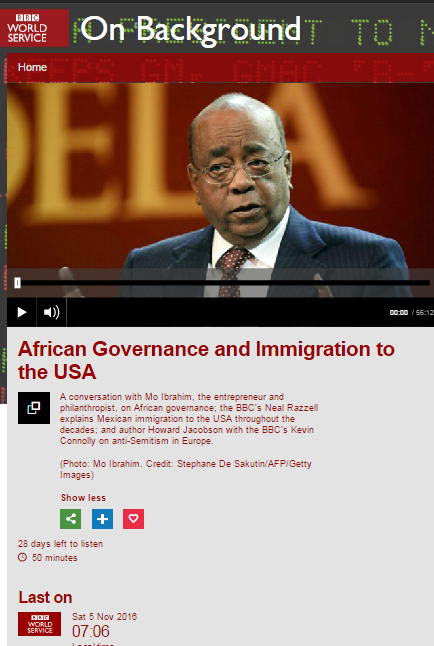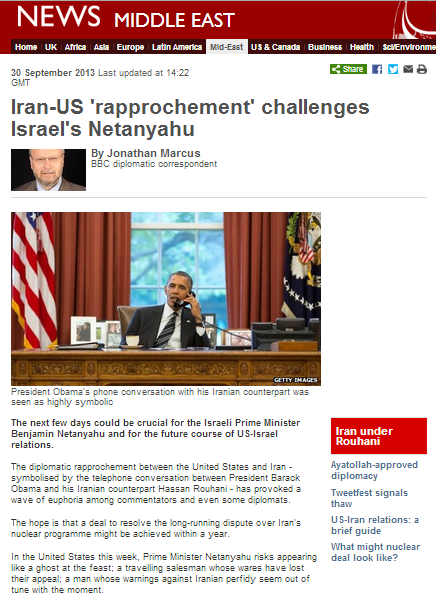On November 5th BBC World Service radio broadcast an edition of the programme ‘On Background’ which included (from 34:20 here) an item described in the synopsis as “author Howard Jacobson with the BBC’s Kevin Connolly on anti-Semitism in Europe”.
The programme has several notable aspects, one of which is the fact that it is co-presented by the BBC’s director of news.
“BBC News’ James Harding and Zanny Minton Beddoes from the Economist dig a little deeper into some of the big stories of the week.”
The item begins with Kevin Connolly revisiting the May 2014 shooting at the Jewish Museum in Brussels in which an Israeli couple, a French woman and a Belgian man were murdered. Notably – in light of the BBC’s record – the incident is accurately described on two occasions as a “terrorist attack”. However, the identity of the suspected attacker and his apparent Islamist motives are not mentioned at all in Connolly’s report.
Given the chosen starting point of the attack on the Jewish museum in Brussels, listeners familiar with its background would perhaps have been rather surprised by the item’s focus on the unrelated topic of Christian antisemitism in Europe.
Referring to his Jewish interviewees from Belgium, Connolly tells audiences:
“Their view is – to some extent because of the Holocaust – that Christian tradition of antisemitism in Europe has been fixed, in inverted commas, by education or by a sense of what is or what is not socially acceptable. But they worry now that new minorities coming into Europe bringing with them the attitudes, for example, of the Middle East or of North Africa, will give antisemitism a new vitality on the continent and will revisit an ancient problem in a modern way.”
Presenter James Harding’s response to that is to ask:
“But is there any evidence […] that antisemitism within a Christian tradition still exists in Europe?”
Later on, following a description of manifestations of antisemitism by Howard Jacobson, Harding responds by saying:
“But Howard Jacobson – wouldn’t there be people listening to you now, particularly Muslim listeners, who’d say consider Islamophobia in Europe; consider the plight of Muslims who are facing much more critical commentary and, frankly, much more hostility across Europe.”
The issue raised by Connolly’s Belgian interviewees in fact receives no serious discussion throughout the item.
Another interesting point about the item is the absence of any introspection on the part of the BBC’s director of news concerning content produced by his own organisation which has amplified the kind of tropes described by his expert guest Howard Jacobson.
Jacobson [46:28]: “And here we get onto the very thorny problem of Israel because in my view – which has got nothing to do with defending Israel at all: the politics of Israel; we can leave that out. But I do think that Israel has enabled a vocabulary of antisemitism to surface and express itself again. I’m not just talking about how we feel about individual Israeli policy. We will find descriptions of what’s happened in Israel that are too close to comfort to medieval tropes about what Jews were like. You will hear people saying Israel is supported by a ‘Jewish lobby’ or there’s an immense amount of money supporting Israel politics or when it comes to Israel, the Jewish lobby is the tail wagging the American dog. So these are all old ways of talking about the Jews that go all the way back to things that were said in Mein Kampf but they now have another…another battle ground if you like.”
Readers may recall that the ‘tail wagging the dog’ theme was promoted by a senior BBC correspondent in September 2013 and that amplification of the notion of a powerful ‘Jewish lobby’ has regrettably been an all too frequent feature of BBC content – for example here, here and here.
Later on in the discussion, Jacobson refers to the Livingstone Formulation.
“I’ll tell you what’s a real problem here: every time you say look, there seems to be an antisemitism problem here, you’re met with a blank wall – I find it quite impertinent actually; I find it insolent – that says all you’re trying to do is stop criticism of Israel. That is such a mantra now, you’ve no idea. In any argument now about the issue of antisemitism, it’s silenced by people who say that they are being silenced: ‘you’re only saying I’m an antisemite to stop me talking; to stop me criticising Israel’. It’s entirely untrue. Criticise Israel all you like but they must see that every time they say that, they are silencing those who say there is a problem with antisemitism.”
As regulars readers know, the BBC has itself frequently promoted the Livingstone Formulation in its own content – including in a backgrounder supposedly designed to help audiences understand the ‘difference’ between antisemitism and anti-Zionism.
Antisemitism is a subject with which the BBC has been visibly struggling for a long time. That struggle manifests itself both as the frequent failure to report accurately (or sometimes, the failure to report at all) on stories involving antisemitism and the failure to adequately address the issue of antisemitism in its own content and on its message boards.
It is therefore all the more regrettable that a programme which claims to ‘dig deeper’ hosted by such a prominent figure as the BBC’s director of news did not actually deliver.
Related Articles:
BBC again dithering (impartially, of course) over antisemitism
Antisemitic comments (again) on BBC WHYS Facebook post… about show on antisemitism




